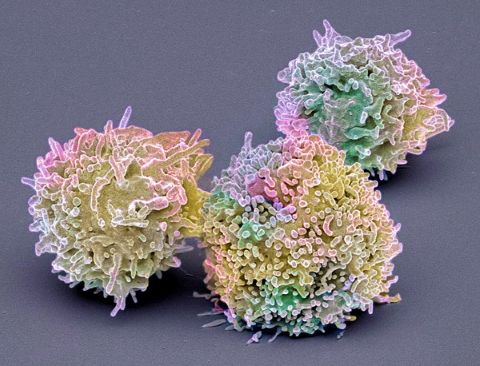
Figure 1: False-colored scanning electron micrograph of resting T cells from a human blood sample. The protein BCL11B is essential for T cell production, but certain mutations in this protein can lead to disruptive effects elsewhere in the body, including the brain. © STEVE GSCHMEISSNER/SCIENCE PHOTO LIBRARY
RIKEN researchers have discovered how a single mutation in one gene can simultaneously result in two symptoms-a severely compromised immune system and problems in brain development1. Similar mechanisms may be at work in cancer and other genetic disorders.
Many diseases are caused by genetic mutations that give rise to defective proteins, which can't do their jobs properly.
An alternative disease mechanism, in which mutated proteins hinder other proteins from doing what they are supposed to do, has been found by a team led by Ichiro Taniuchi of the RIKEN Center for Integrative Medical Sciences.
Taniuchi and his team are interested in genetic factors and pathways that underlie the development of the immune system.
One such gene, BCL11B, encodes a protein that plays a critical role in the production of T cells, which hunt down and eliminate diseased and cancerous cells. Defects in this gene can severely disrupt immune function.
Children born with certain BCL11B mutations also exhibit deficits in brain development.
Taniuchi's team characterized the effects of one such mutation, known as BCL11BN441K. They discovered that mice with an equivalent mutation in their Bcl11b gene were born with clear, early-onset impairments in T cell production.
Notably, these mice tended to produce excessive levels of another class of immune cells resembling natural killer cells. Mice with the BCL11BN441K-equivalent mutation also showed various defects in brain development, especially in the cerebral cortex.
Intriguingly, the scope and nature of these defects differed considerably from what occurs in mice entirely lacking functional Bcl11b.
Some phenotypes observed in these Bcl11bN440K mice also appeared to have abnormalities normally associated with the loss of Bcl11a, a gene from the same family as Bcl11b that conducts its own set of complementary but distinctive functions. For example, Bcl11a deficiency contributes to both the abnormal generation of natural killer-like cells in the thymus and the underdevelopment of the cortex, whereas outright loss of Bcl11b does not.
Based on these and other observations, the researchers identified a distinctive disease mechanism in which mutant BCL11B binds to BCL11A and manages to interfere with the normal function of that unmutated protein.
This is the second time that Taniuchi's team has identified this mechanism-and he doubts it will be the last. "The mechanism could be behind other human diseases, including cancer," he says.
Taniuchi anticipates that such conditions could be remedied with drugs designed to prevent the formation of such disease-associated complexes.






